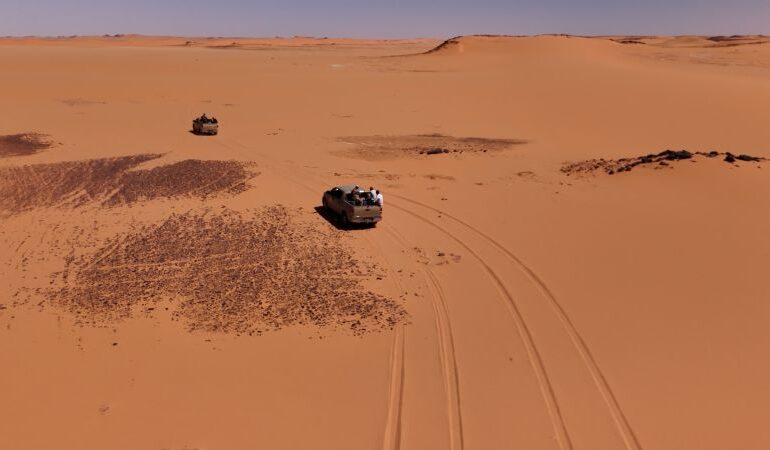Human Traffickers Exploit Refugees in Libya’s Sahara Desert

The plight of refugees in Libya’s Sahara Desert is dire, with human traffickers extorting ransoms from families desperate to save their loved ones. Among those affected is Abeba, who received a chilling audio message from her brother Daniel, currently held captive somewhere in southern Libya. His captors demand $10,000 for his release, a sum that Abeba and her husband struggle to raise.
Daniel’s situation is not unique; countless migrants endure similar fates in Libya, a key transit country for those fleeing war and persecution in search of a better life in Europe. Many refugees come from Sudan, where ongoing civil conflict has displaced millions. While some migrants pay smugglers for perilous journeys across the Mediterranean, others fall into the hands of traffickers who exploit their vulnerabilities.
Torture and Extortion in the Desert
Refugees often face horrific treatment at the hands of traffickers. Videos reviewed by CNN depict Daniel enduring brutal torture, including beatings and humiliation. His family fears for his life, as the threats from his captors grow more severe with each desperate call for help. UN statistics reveal that Eritreans represent a significant portion of refugees in Libya, many fleeing oppressive regimes and forced military service.
The vast Sahara Desert complicates efforts to combat trafficking. Colonel Mohammad Hassan Rahil, commanding a Libyan National Army post near the Sudanese border, acknowledges the challenges faced by local authorities. Despite their attempts to patrol the area, traffickers navigate the terrain with greater familiarity, making their operations difficult to disrupt.
In the town of Al Jawf, police have arrested individuals suspected of facilitating the trafficking network. One Sudanese man, detained for transferring ransom payments, claims ignorance regarding the extent of the abuse suffered by victims. This highlights the complex, compartmentalized nature of the trafficking industry, which operates through informal money transfer systems like “hawala.”
Systemic Issues and Human Rights Concerns
The involvement of traffickers is often opportunistic, relying on the desperation of families trying to save their loved ones. In a significant incident three years ago, police raided a compound in the desert and freed dozens of men held for ransom. The trafficker, Tsinat Tesfay, was later convicted of “forced disappearance” and is currently serving a life sentence in Benghazi.
Despite some successes in law enforcement, the trafficking industry remains resilient. Many traffickers are nationals from the same countries as the victims, making it challenging to dismantle these operations. Recent arrests of high-profile traffickers illustrate the ongoing international implications of this issue, as countries grapple with how to address the influx of migrants.
The humanitarian crisis deepens for many who manage to escape captivity. In Benghazi‘s Ganfuda Detention Center, former trafficking victims, including a 16-year-old Eritrean girl known as Abrihet, recount their harrowing experiences. Abrihet reveals the physical and emotional scars inflicted upon her, highlighting the profound impact of this exploitative network.
Col. Mohammed Al-Fadhil from Libya’s Department for Combating Illegal Migration emphasizes the need for international cooperation to tackle the trafficking crisis. While he claims improvements have been made, he acknowledges that the situation remains critical, requiring collective action from all nations affected by illegal migration.
In 2016, the European Union struck a deal with Libya’s government to curb migrant crossings, resulting in a notable decrease in attempts to traverse the Mediterranean. However, this has also led to increased detentions in squalid conditions, raising serious human rights concerns.
As the number of refugees continues to rise, particularly among those fleeing Sudan, the urgency for intervention becomes clearer. Abeba’s efforts to secure her brother’s release come at a steep price, both financially and emotionally. “May God punish them for what they did,” she pleads, reflecting the anguish of many families impacted by this dark chapter of human trafficking in Libya.
The stories of the refugees remain largely unheard, echoing the need for the global community to address the systemic issues fueling this crisis.






